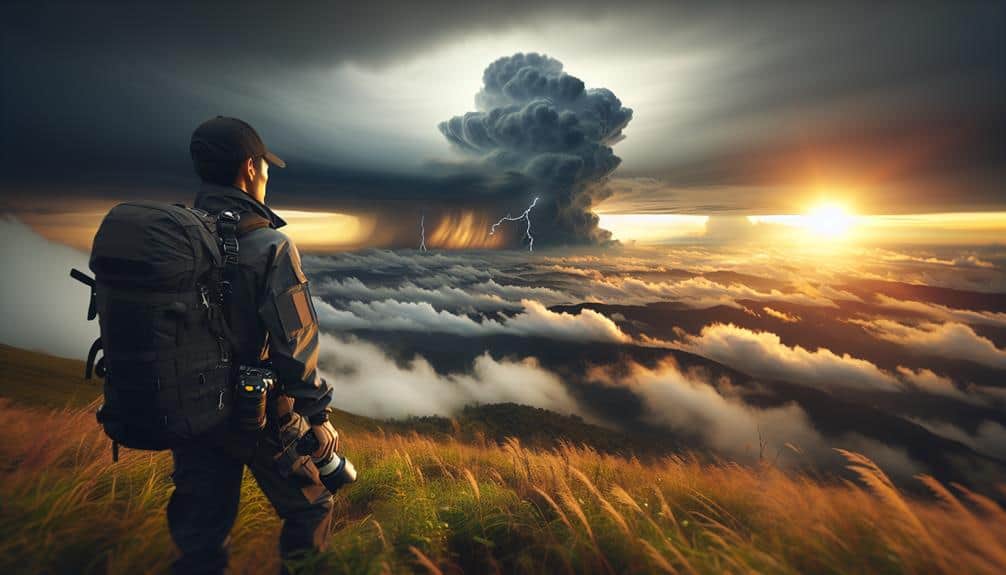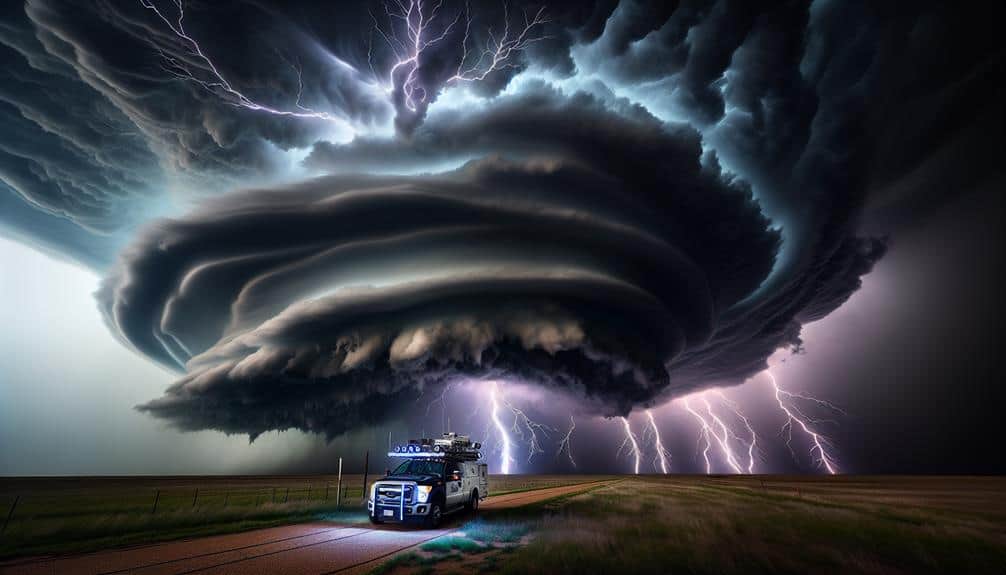As storm chasers, we encounter distinctive mental health challenges that demand proactive methods and strong support systems. It's important to acknowledge the adrenaline rush can mask stress, so we should prioritize mental health and resilience. Mindfulness, breathing exercises, and meditation are efficient stress management techniques. Building a network with family, friends, and trusted colleagues offers necessary emotional support. Professional help provides customized strategies to handle anxiety and build resilience. Balancing work and life through clear boundaries and enjoyable activities is crucial to well-being. By understanding these strategies, we guarantee a healthier mental state during our exhilarating pursuits.
Key Points
- Practice mindfulness, breathing exercises, and meditation to manage stress.
- Build a support network including family, friends, and trusted colleagues for emotional support.
- Seek professional mental health support for personalized coping strategies and resilience building.
- Set boundaries and prioritize self-care to balance work and personal life.
Understanding the Mental Toll
As storm chasers, we must understand that the adrenaline rush of our pursuits can often mask the significant mental toll it takes on us. While the thrill of chasing storms fuels our passion for adventure, being mindful of how this high-intensity lifestyle impacts our mental health is vital.
We must prioritize mental health awareness and self-care, ensuring that we're not just physically prepared, but emotionally resilient too.
Recognizing the need for self-care is an important first step. We mightn't always realize how the constant anticipation and potential danger can lead to stress and emotional fatigue. By practicing emotional regulation, we can better manage our reactions and maintain a balanced state of mind. It's about knowing when to step back, take a deep breath, and allow ourselves the space to decompress.
Stress management techniques, such as mindfulness and relaxation exercises, can be helpful. They help us stay grounded, improving our overall well-being.
As a community, let's support each other in acknowledging the mental toll of storm chasing and promote a culture of open dialogue and proactive mental health practices. Our freedom to chase storms should be accompanied by our dedication to mental wellness.
Coping With High Stress
We all know the pressure we face chasing storms can be overwhelming, but there are effective ways to manage it.
By incorporating mindfulness and breathing techniques, building a strong support network, and developing resilience strategies, we can better handle the stress.
Let's explore how these methods can help us stay grounded and perform at our best.
Mindfulness and Breathing Techniques
In the heart of a storm, practicing mindfulness and effective breathing techniques can be our anchor, helping us manage the intense stress that comes with chasing severe weather. As storm chasers, our adrenaline often runs high, and having the right tools to stay centered is essential.
Meditation practices and relaxation techniques offer us a way to calm our minds, even when the skies are roaring above us.
In those moments of high tension, grounding exercises can bring us back to the present, ensuring we stay focused on our tasks. Simple stress relief strategies, like deep breathing, can slow our heart rate and help us think more clearly.
We can try inhaling deeply through our nose for a count of four, holding for four, and exhaling through our mouth for another count of four. This four-square breathing technique is powerful and easy to use, even in the middle of a storm.
Building a Support Network
Relying on a strong support network can make all the difference when we're coping with the high stress of storm chasing. Whether we're out in the field or analyzing data, the pressures associated with this exhilarating yet demanding pursuit can take a toll on our mental well-being. Having a solid support system in place is crucial to help us navigate these challenges.
Building a support network involves several key components:
- Family and Friends: Let's not underestimate the power of a conversation with someone who cares. They can offer a listening ear and a different perspective.
- Professional Help: Engaging with therapy options can provide us with vital tools to handle stress and anxiety. Therapists can assist us in developing coping strategies tailored to our unique experiences.
Incorporating these elements into our lives can profoundly impact our mental health. By leaning on our support networks, we gain the freedom to chase our passions while maintaining our well-being.
Developing Resilience Strategies
Developing resilience strategies is essential for us to effectively manage the high stress that comes with storm chasing. Maneuvering through extreme weather conditions can be exhilarating, but it also places a heavy toll on our mental well-being. To cope, we need to prioritize self care practices and emotional regulation.
First, let's focus on stress management. It's vital that we identify what triggers our stress and develop positive coping strategies. Deep breathing exercises, mindfulness, and regular physical activity can help us stay grounded. These practices not only reduce anxiety but also improve our overall resilience.
Moreover, we mustn't neglect emotional regulation. Storm chasing can be emotionally intense, and it's important to maintain a balanced emotional state. Techniques like journaling or talking to a trusted friend can provide an outlet for our feelings and prevent emotional burnout.
Lastly, incorporating consistent self care practices into our routine is non-negotiable. Ensuring we get adequate rest, maintain a healthy diet, and take breaks when necessary will keep our minds and bodies in peak condition.
Building a Support System

As storm chasers, we understand the importance of having a strong support system to navigate the challenges we face.
By leaning on trusted colleagues, family and friends, and seeking professional mental health support, we can build a network that helps us stay grounded.
Let's explore how these connections can make a difference in our well-being.
Trusted Colleagues Network
Building a strong network of trusted colleagues is vital for maintaining our mental well-being while navigating the high-stress world of storm chasing. When we're out in the field, facing the unpredictable forces of nature, having a solid foundation of peer support can make all the difference.
These connections aren't just about sharing data and strategies; they're about creating a safety net that supports our mental health and overall well-being.
It's essential to foster these colleague connections through regular communication and mutual respect. By building these relationships, we can:
- Share experiences and coping strategies to manage stress and anxiety.
- Offer and receive emotional support during and after intense storm chasing events.
We all know that storm chasing can be both exhilarating and exhausting. That's why it's so important to lean on each other, to lift each other up during tough times.
Our colleagues understand the specific pressures we face, and that understanding forms the backbone of a supportive network.
Let's continue to nurture these connections, ensuring we all thrive both professionally and personally.
Family and Friends
While our network of colleagues forms an integral part of our support system, our family and friends also play an essential role in helping us navigate the mental challenges of storm chasing. Their unwavering support offers a sense of stability and comfort that can be hard to find in our high-risk profession.
However, it's crucial to establish clear communication boundaries to make certain that our relationships remain healthy and supportive. We need to be open about our experiences, but also mindful not to overburden our loved ones with the more distressing details. This balance allows us to share our journey without causing undue worry.
Additionally, we should encourage family and friends to express their concerns and feelings. By maintaining open dialogue, we create an environment where everyone feels heard and valued.
Incorporating self-care tips into our daily routine is another important aspect. Activities such as mindfulness exercises, regular physical activity, and quality time with loved ones can greatly strengthen our mental health. By prioritizing self-care, we not only improve our resilience but also strengthen our relationships, ensuring that our support system remains strong and nurturing, even amidst the chaos of storm chasing.
Professional Mental Health Support
Understanding the importance of professional mental health support is vital for us as storm chasers to navigate the unique stresses of our job. We face unpredictable and high-stress situations that can take a toll on our emotional wellbeing. Seeking professional help can be a game-changer, offering us tools for personal growth and coping strategies that we mightn't find elsewhere.
Building a support system with mental health professionals doesn't mean we're weak—it signifies strength and self-awareness. These experts can help us manage the unique anxieties and pressures we experience, allowing us to thrive in both our personal and professional lives.
Here are some benefits of seeking professional mental health support:
- Personalized Coping Strategies: Tailored techniques to manage stress and anxiety effectively.
- Emotional Resilience: Building emotional strength to handle the unpredictable nature of storm chasing.
We value our freedom and independence, but recognizing when we need help and seeking it out is an important step toward maintaining our mental health. Together, with the right support, we can continue to chase storms without compromising our emotional wellbeing.
Managing Fear and Anxiety
Confronting fear and anxiety head-on is necessary for storm chasers who often face life-threatening situations. It's common knowledge that these intense experiences can take a toll on our mental well-being.
To navigate these challenges, it's essential we adopt effective self-care practices and stress management techniques. By prioritizing our mental health, we can stay resilient and focused in the face of danger.
One of the foundational steps in managing fear is emotional regulation. We need to be conscious of our emotional responses and develop coping mechanisms that allow us to stay calm under pressure. Techniques like deep breathing, mindfulness, and even visualization can help us maintain composure when we're on the front lines of a storm.
Additionally, building a strong support system is crucial. Sharing our experiences and emotions with fellow storm chasers or loved ones can provide emotional relief and foster a sense of community.
It's also beneficial to set aside time for activities that we enjoy and that help us unwind, whether it's reading, exercising, or simply taking a moment to relax.
Balancing Work and Life

Balancing work and life as storm chasers requires us to set boundaries that protect our personal time and mental well-being. It's important to recognize that while our work is exhilarating and essential, it can also be all-consuming. To maintain a healthy work life balance, we need to prioritize self care practices that allow us to recharge and stay grounded.
One of the best ways to achieve this balance is by establishing clear boundaries between our professional and personal lives. This means setting aside time where we unplug from weather updates and focus on activities that rejuvenate us.
Here are a few practices that can help:
- Schedule downtime: Block out specific times in our calendars for rest and relaxation, treating this time as non-negotiable.
- Engage in hobbies: Pursue interests outside of storm chasing to maintain a well-rounded life and reduce stress.
Recognizing Burnout Signs
As storm chasers, we need to be watchful about recognizing the early signs of burnout to safeguard our mental health and effectiveness in the field. Burnout can sneak up on us, especially given the high-stress nature of our work. It's essential to start by identifying triggers that contribute to feelings of exhaustion and overwhelm. These might include prolonged periods of high-intensity chases, lack of sleep, or constant exposure to severe weather conditions.
We should watch for symptoms like chronic fatigue, irritability, and a sense of detachment from our passion for storm chasing. If we notice these signs, it's time to prioritize self-care.
Simple self-care tips can make a world of difference: make sure we're getting adequate rest, maintain a balanced diet, and carve out time for hobbies that bring us joy outside of storm chasing.
Let's also remember to connect with our support systems. Sharing our experiences and concerns with fellow storm chasers or loved ones can lighten the emotional load.
Seeking Professional Help

Recognizing when we need professional help is an important step in maintaining our mental health as storm chasers. It's vital to identify those moments when our self-care practices aren't enough. Seeking professional help doesn't mean we're weak; it shows our strength in acknowledging that we need support.
Many of us value our independence, but sometimes reaching out is the best way to stay strong and resilient. There are numerous resources available to us:
- Online therapy resources: Accessible from anywhere, providing flexibility for our unpredictable schedules.
- Mental health hotlines: Immediate, confidential support when we need it most.
When we seek professional help, we're taking proactive steps to manage our well-being. Therapy sessions can provide us with tools to handle stress, anxiety, and trauma, which are common in our line of work.
Online therapy resources make it easier for us to fit these sessions into our demanding routines.
Frequently Asked Questions
How Can Storm Chasing Impact Long-Term Mental Health?
Did you know 30% of storm chasers report high stress levels? We need effective coping strategies and self-care for long-term mental wellness. Professional support can help us navigate the challenges and maintain our mental health.
What Role Does Preparation Play in Reducing Stress for Storm Chasers?
Preparation benefits us by allowing us to anticipate challenges and equip ourselves properly. Stress reduction stems from knowing we've done everything possible to stay safe, giving us the freedom to focus on the thrill of the chase.
Are There Specific Mental Health Resources Tailored for Storm Chasers?
Yes, there are specific mental health resources tailored for storm chasers. We can find supportive networks and learn effective coping mechanisms to help us manage stress, ensuring we maintain our freedom and passion for the chase.
How Can Storm Chasers Maintain Mental Resilience During Off-Seasons?
We can maintain mental resilience during off-seasons by practicing self-care strategies, using coping mechanisms, and seeking social support. Outdoor activities also help us stay grounded and connected, promoting both mental wellness and a sense of freedom.
What Are the Benefits of Mindfulness Practices for Storm Chasers?
Studies show that 60% of storm chasers report improved focus and stress reduction through mindfulness practices. Let's embrace these techniques to stay calm, clear-headed, and resilient while facing the thrilling unpredictability of our work.


